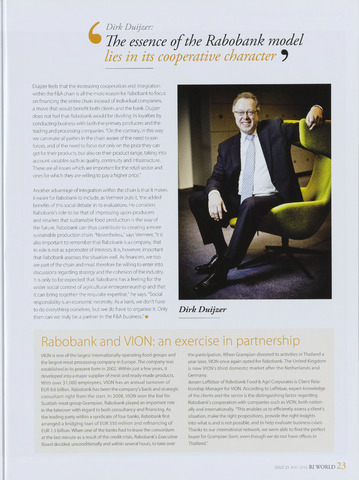The essence of the Rabobank model
lies in its cooperative character 9
Rabobank and VION: an exercise in partnership
Dirk Duijzer:
Dirk Duijzer
Duijzer feels that the increasing cooperation and integration
within the F&A chain is all the more reason for Rabobank to focus
on financing the entire chain instead of individual companies,
a move that would benefit both clients and the bank. Duijzer
does not feel that Rabobank would be dividing its loyalties by
conducting business with both the primary producers and the
trading and processing companies. "On the contrary, in this way
we can make all parties in the chain aware of the need to join
forces, and of the need to focus not only on the price they can
get for their products, but also on their product range, taking into
account variables such as quality, continuity and infrastructure.
These are all issues which are important for the retail sector and
ones for which they are willing to pay a higher price."
Another advantage of integration within the chain is that it makes
it easier for Rabobank to include, as Vermeer puts it, 'the added
benefits of this social debate' in its evaluations. He considers
Rabobank's role to be that of impressing upon producers
and retailers that sustainable food production is the way of
the future. Rabobank can thus contribute to creating a more
sustainable production chain. "Nevertheless," says Vermeer, "it is
also important to remember that Rabobank is a company, that
its role is not as a promoter of interests. It is, however, important
that Rabobank assesses the situation well. As fïnancers, we too
are part of the chain and must therefore be willing to enter into
discussions regarding strategy and the cohesion of the industry.
It is only to be expected that Rabobank has a feeling for the
wider social context of agricultural entrepreneurship and that
it can bring together the requisite expertise," he says. "Social
responsibility is an economie necessity. As a bank, we don't have
to do everything ourselves, but we do have to organise it. Only
then can we truly be a partner in the F&A business."
VION is one of the largest internationally operating food groups and
the largest meat processing company in Europe. The company was
established in its present form in 2002. Within just a few years, it
developed into a major supplier of meat and ready-made products.
With over 31,000 employees, VION has an annual turnover of
EUR 9.6 billion. Rabobank has been the company's bank and strategie
consultant right from the start. In 2008, VION won the bid for
Scottish meat group Grampian. Rabobank played an important role
in the takeover with regard to both consultancy and financing. As
the leading party within a syndicate of four banks, Rabobank first
arranged a bridging loan of EUR 350 million and refïnancing of
EUR 1.5 billion. When one of the banks had to leave the consortium
at the last minute as a result of the credit crisis, Rabobank's Executive
Board decided, unconditionally and within several hours, to take over
the participation. When Grampian divested its activities in Thailand a
year later, VION once again opted for Rabobank. The United Kingdom
is now VION's third domestic market after the Netherlands and
Germany.
Jeroen Leffelaar of Rabobank Food Agri Corporates is Client Rela-
tionship Manager for VION. According to Leffelaar, expert knowledge
of the clients and the sector is the distinguishing factor regarding
Rabobank's cooperation with companies such as VION, both nation-
ally and internationally. "This enables us to efficiently assess a client's
situation, make the right propositions, provide the right insights
into what is and is not possible, and to help evaluate business cases.
Thanks to our international network, we were able to find the perfect
buyer for Grampian Siam, even though we do not have offices in
Thailand."
ISSUE 23 MAY 2010 RI WORLD

